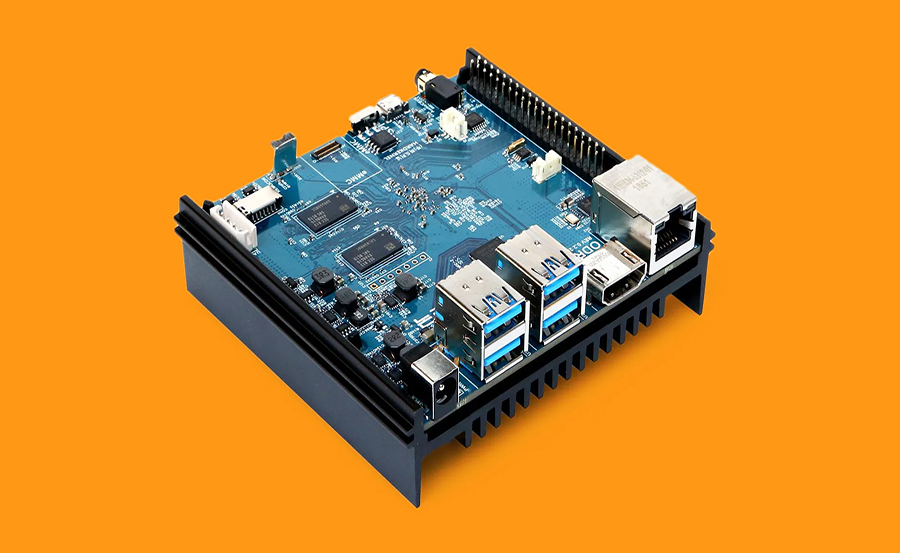In recent years, the Raspberry Pi has transcended its origins as a modest educational tool to become an integral component across various industries. The possibilities are endless, from streamlining operations to boosting productivity. In this guide, we’ll explore the applications of Raspberry Pi in industrial settings, with a particular focus on how it can revolutionize IPTV services, notably through solutions like Rapid IPTV.
Understanding Raspberry Pi: A Quick Overview
Before delving into its industrial applications, it’s crucial to understand what Raspberry Pi actually is. Essentially, it’s a compact and affordable computer, capable of executing a multitude of tasks typically reserved for larger systems. This versatility makes it a viable option across different sectors.
The Evolution of Raspberry Pi
The journey of Raspberry Pi began with its development by the Raspberry Pi Foundation, aiming to promote computer science learning. Over the years, it has transformed, with iterations becoming more powerful, yet retaining their affordability and accessibility.
Helpful Hint:
Say goodbye to cable and hello to convenience with 1 Year Rapid IPTV Subscription our affordable IPTV subscription service.
Notably, models like the Raspberry Pi 4 boast robust specifications that rival traditional computers, making them suitable for industrial environments where tasks demand reliability and efficiency.
Features That Make Raspberry Pi Ideal for Industrial Use
Several features make Raspberry Pi a compelling choice for industrial settings. These include:
- Compact size: Allows it to fit into tight spaces.
- Low power consumption: Offers energy-saving benefits.
- Flexibility: Supports multiple programming languages and tools.
Incorporating Raspberry Pi can lead to cost-effective solutions, enhancing operational efficiency.
Applications of Raspberry Pi in Industrial Environments
Industries such as manufacturing, agriculture, and telecommunications are reaping the benefits of Raspberry Pi. Let’s explore some of the pivotal applications in these domains.
Manufacturing
In manufacturing, Raspberry Pi is increasingly being used for automation and control processes. Whether it’s monitoring machinery health or improving the supply chain, Raspberry Pi offers unparalleled flexibility.
By integrating it with sensors, manufacturers can collect and analyze real-time data, helping in predictive maintenance and thereby reducing downtimes.
Agriculture
In agriculture, Raspberry Pi facilitates smart farming by enabling data collection on soil health, moisture levels, and more. This data-driven approach can significantly enhance crop yields and promote sustainable practices.
The ability to automate irrigation systems based on real-time data ensures resource optimization and improved crop health.
Telecommunications
The telecommunications industry also benefits, with Raspberry Pi serving as a reliable tool for testing and managing hardware configurations. It allows for seamless integration with devices, ensuring consistent communication channels.
This brings us to the realm of IPTV, where Raspberry Pi has made significant strides, particularly through solutions like Rapid IPTV.
Integrating Raspberry Pi with Rapid IPTV
In the field of IPTV services, efficiency and reliability are paramount. This is where Raspberry Pi, combined with premium solutions like Rapid IPTV, makes a noteworthy impact. Let’s delve into how this integration can be achieved.
Installing IPTV on Raspberry Pi
Setting up Rapid IPTV with Raspberry Pi involves some straightforward steps. Firstly, you need to ensure your Raspberry Pi is up-to-date with the latest software libraries.
Once ready, the Rapid IPTV setup, known for being the best IPTV service for live TV, can be installed. The system supports various platforms, making it versatile for different applications.
Benefits of Using Rapid IPTV with Raspberry Pi
Rapid IPTV is renowned for its outstanding streaming quality and reliability. When used with Raspberry Pi, users can enjoy robust live TV services without frequent interruptions, thanks to the powerful hardware capabilities of Raspberry Pi.
The small footprint of Raspberry Pi also means it can be easily deployed in various locations, further enhancing the versatility of Rapid IPTV services.
Achieving Seamless Streaming
Ensuring seamless streaming requires proper setup and configuration. With Raspberry Pi’s support for high-definition media output, users experience minimal buffering, which is crucial for delivering high-quality IPTV services.
The sync between Raspberry Pi’s hardware and Rapid IPTV’s service ensures that live TV streaming remains smooth and uninterrupted, maintaining high user satisfaction.
Optimizing Performance and Security
Industrial environments demand robust security measures. Raspberry Pi, equipped with Rapid IPTV, can leverage additional software to secure network integrity and prevent data breaches.
Automated updates and firewall configurations ensure that both Raspberry Pi and Rapid IPTV remain protected against potential threats, thus safeguarding operational continuity.
Implementing Raspberry Pi Across Various Industries
The potential use cases of Raspberry Pi extend far beyond its current applications. As technology advances, so do the opportunities for Raspberry Pi to further integrate into fundamental industry operations.
Healthcare
The healthcare sector can benefit significantly from Raspberry Pi by adopting it for medical device management and real-time patient monitoring. Its cost-effectiveness and reliability make it a practical choice.
Connected healthcare solutions using Raspberry Pi lead to improved patient outcomes by enabling timely interventions based on accurate data insights.
Retail
For the retail sector, Raspberry Pi presents opportunities in point-of-sale systems and inventory management. Portable and customizable kiosks powered by Raspberry Pi can streamline retail operations.
Additionally, Raspberry Pi’s ability to process transactions securely and efficiently makes it ideal for enhancing customer experience in retail environments.
Energy
Key applications in energy industries involve using Raspberry Pi for automation of grid systems. Monitoring energy consumption and optimizing usage are integral for modern energy management, where Raspberry Pi plays a significant role.
The ability to remotely control and monitor electricity distribution can lead to significant cost savings and improved energy resource management.
The Future of Raspberry Pi in Industrial Applications
The future is bright for Raspberry Pi, with continuous advancements paving the way for expanded industrial applications. The seamless integration with services like Rapid IPTV signifies just the beginning of its potential.
Emerging Technologies
As emerging technologies like AI and IoT evolve, Raspberry Pi stands poised to become a cornerstone in implementing these innovations in industrial settings. Its compatibility with various technologies ensures its ongoing relevance.
Moreover, the development of more powerful versions of Raspberry Pi can only enhance its applications further, providing companies with robust tools at a fraction of traditional costs.
Expanding Open-Source Community
The vast open-source community surrounding Raspberry Pi is a vital asset, propelling the continuous exchange of ideas and improvements in functionality.
This collaborative ecosystem fosters innovative solutions and ensures the Raspberry Pi remains competitive, addressing the ever-changing needs of industries worldwide.
Integrating Sustainable Practices
Raspberry Pi’s minimal environmental impact, due to its low power consumption and small size, aligns well with the growing emphasis on sustainable industrial practices.
By adopting Raspberry Pi, industries not only gain in operational efficiency but also contribute positively toward environmental conservation efforts.
Potential Challenges and Considerations
While promising, the integration of Raspberry Pi in industrial contexts isn’t devoid of challenges. Industrial-scale operations may require tailored solutions for Raspberry Pi implementation, ensuring compatibility and performance standards are met.
Moreover, obtaining the specialized skills needed for optimizing and maintaining Raspberry Pi systems in an industrial setting remains another crucial area of focus for businesses.
Frequently Asked Questions

What is Rapid IPTV and why is it considered the best?
Rapid IPTV is a highly regarded IPTV service, famed for its exceptional live TV streaming quality and reliability. It’s considered the best due to its consistent service performance and user-friendly interface, ensuring an unparalleled viewing experience.
Can Raspberry Pi support industrial-scale IPTV solutions?
Absolutely. With its robust hardware and software capabilities, Raspberry Pi can support industrial-scale IPTV solutions, making it a versatile choice for businesses aiming to enhance their IPTV services.
Is it difficult to install Rapid IPTV on a Raspberry Pi?
Not at all. The installation process is straightforward, especially with comprehensive guides available online. Once the setup is complete, incorporating Rapid IPTV services on Raspberry Pi is seamless.
What are the security measures required when using Raspberry Pi in industrial settings?
When using Raspberry Pi in industrial settings, implementing robust security measures such as firewalls, regular software updates, and encrypted communications is crucial to safeguarding data integrity and the operational network.
How does using Raspberry Pi contribute to sustainable practices?
Raspberry Pi’s low power consumption and small physical footprint significantly reduce the environmental impact, aligning well with values of sustainability and reducing resource consumption across industries.
What industries stand to benefit most from integrating Raspberry Pi?
Virtually all industries, including manufacturing, healthcare, retail, and energy, can benefit from integrating Raspberry Pi. Its flexibility, cost-effectiveness, and scalability make it an appealing solution for varied industry needs.
Does the integration of Raspberry Pi require new technical skills?
While basic computer literacy aids in Raspberry Pi integration, more complex applications might necessitate additional technical skills. Training and resources are widely available to address these needs and ensure effective use.
Blocking Wi-Fi Interference for Improved IPTV Streaming

